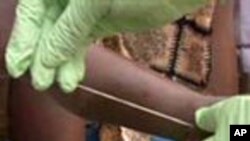<!-- IMAGE -->Guinea worm disease, a painful and crippling parasite affliction, has been almost entirely eradicated in Ghana, thanks to the tireless efforts of village-based volunteers and ministry of health staff, with assistance from the Carter Center, UNICEF, the World Health Organization, and other partner organizations.
The disease is contracted when people consume water contaminated with infected larvae. After a year, the one-meter long worm causes an agonizingly painful blister on the skin which becomes a lesion through which it emerges. Children and adults suffering from the disease are unable to attend school or to work and can become incapacitated for an average of two months after the Guinea worm has begun to emerge. Communities suffer food shortages when their afflicted residents are unable to farm.
The Carter Center, a non-profit, non-governmental organization, was established in 1982 by former U.S. President Jimmy Carter and his wife, Rosalynn. When the Carter Center launched its Guinea Worm Eradication Program in 1987, assisting Ghana's ministry of health with its Guinea Worm Eradication Program was its first priority. At that time, there were about 180,000 cases in Ghana and about 6,000 affected villages. In 2008, Ghana reported only 501 cases of the disease from only 46 endemic villages.
When the Carter Center began to assist Ghana, "there was Guinea worm all over the place, especially in the north," said Donald Hopkins, a health expert at the center. "It was horrific, painful and severely impeding agricultural productivity," he said.
Partnering with Ghana's Ministry of Health, the center helped educate local volunteers about the disease, and provided nylon mesh filters and ABATE Larvicide to help protect residents of affected villages by promoting the need to filter all drinking water and treating all contaminated sources. By 1994, Ghana had achieved a 95 percent decrease in the number of cases. "Ghana is closer than it's ever been to a clean state," said Mr. Hopkins.
The success in Ghana is being repeated around the world. Back in 1987, there were about 3.5 million cases of Guinea worm in twenty nations, but as of the end of 2008, only 4,619 cases of Guinea worm disease were reported from about 1,000 villages from just six countries - Sudan, Ghana, Mali, Ethiopia, Nigeria and Niger.
The United States is committed to working with Ghana, other African nations, and its international partners to eliminate an age-old enemy of mankind, Guinea Worm disease.
The disease is contracted when people consume water contaminated with infected larvae. After a year, the one-meter long worm causes an agonizingly painful blister on the skin which becomes a lesion through which it emerges. Children and adults suffering from the disease are unable to attend school or to work and can become incapacitated for an average of two months after the Guinea worm has begun to emerge. Communities suffer food shortages when their afflicted residents are unable to farm.
The Carter Center, a non-profit, non-governmental organization, was established in 1982 by former U.S. President Jimmy Carter and his wife, Rosalynn. When the Carter Center launched its Guinea Worm Eradication Program in 1987, assisting Ghana's ministry of health with its Guinea Worm Eradication Program was its first priority. At that time, there were about 180,000 cases in Ghana and about 6,000 affected villages. In 2008, Ghana reported only 501 cases of the disease from only 46 endemic villages.
When the Carter Center began to assist Ghana, "there was Guinea worm all over the place, especially in the north," said Donald Hopkins, a health expert at the center. "It was horrific, painful and severely impeding agricultural productivity," he said.
Partnering with Ghana's Ministry of Health, the center helped educate local volunteers about the disease, and provided nylon mesh filters and ABATE Larvicide to help protect residents of affected villages by promoting the need to filter all drinking water and treating all contaminated sources. By 1994, Ghana had achieved a 95 percent decrease in the number of cases. "Ghana is closer than it's ever been to a clean state," said Mr. Hopkins.
The success in Ghana is being repeated around the world. Back in 1987, there were about 3.5 million cases of Guinea worm in twenty nations, but as of the end of 2008, only 4,619 cases of Guinea worm disease were reported from about 1,000 villages from just six countries - Sudan, Ghana, Mali, Ethiopia, Nigeria and Niger.
The United States is committed to working with Ghana, other African nations, and its international partners to eliminate an age-old enemy of mankind, Guinea Worm disease.













